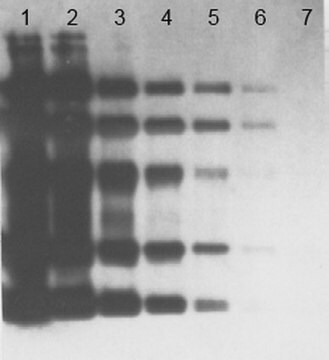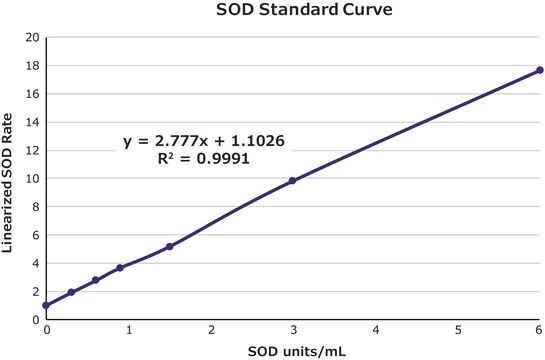MAK486
Carbonyl Assay Kit
sufficient for 100 colorimetric tests
Synonym(s):
Protein Carbonyl Content Assay Kit
Sign Into View Organizational & Contract Pricing
All Photos(1)
About This Item
UNSPSC Code:
12161503
NACRES:
NA.84
Recommended Products
Quality Level
detection method
colorimetric
relevant disease(s)
cardiovascular diseases; cancer; gastrointestinal diseases; aging/geriatric diseases; neurological disorders
shipped in
wet ice
storage temp.
−20°C
General description
Carbonyl groups, such as ketones and aldehydes, are a common indicator of protein oxidation. Protein oxidation is caused because of exposure to reactive oxygen species (ROS) and is a common marker in various diseases, as well as aging.
Features and Benefits
- Linear detection range from 12 to 250 µM carbonyl
- Compatible with high-throughput handling systems.
- Convenient. The procedure involves adding a single working reagent, and reading the absorbance after 30 minutes.
Suitability
The kit is suitable for the quantification of carbonyl groups (e.g. ketones, aldehydes) or protein carbonyls in biological samples (e.g. oxidized BSA, etc.).
Principle
The Carbonyl Assay Kit is based on an improved method, where 2,4-dinitrophenylhydrazine (DNPH) reacts with carbonyl groups to produce a colored compound at 375 nm. The intensity of this colored compound is directly proportional to the carbonyl groups in the sample.
signalword
Warning
hcodes
pcodes
Hazard Classifications
Met. Corr. 1
Storage Class
8A - Combustible corrosive hazardous materials
wgk_germany
WGK 1
Choose from one of the most recent versions:
Certificates of Analysis (COA)
Lot/Batch Number
It looks like we've run into a problem, but you can still download Certificates of Analysis from our Documents section.
If you need assistance, please contact Customer Support.
Already Own This Product?
Find documentation for the products that you have recently purchased in the Document Library.
Our team of scientists has experience in all areas of research including Life Science, Material Science, Chemical Synthesis, Chromatography, Analytical and many others.
Contact Technical Service




